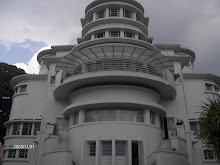Name: Alma Prima. N
Student Number: 0809326
Class: 3B
Periods of English Lliterature
Literature is referred to as the entirety of written expression, with the restriction that not every written document can be categorized as literature in the more exact sense of the word. There are usually include additional adjectives such as “aesthetic” or “artistic” to distinguish literary works from texts of everyday use such as telephone books, newspaper, legal documents and scholarly writings.
There are a periods of literature, that has some criteria. The criteria for classification must not distract from the fact that such criteria are relative and that any attempt to relate divergent texts to a single period of literary history is always problematic. The criteria for classification derive from fields such as:
1. The Old English Period or the Anglo-Saxon Period
Is regarded as beginning with the invasion of Britain by Germanic (Anglo-Saxon) tribes in the 5th century AD and lasting until the French invasion under William the Conqueror in 1066. During the Old English Period, written literature began to develop from oral tradition, and in the eighth century poetry written in the vernacular Anglo-Saxon (also known as Old English) appeared. One of the most well-known eighth century Old English pieces of literature is Beowulf, a great Germanic epic poem. Two poets of the Old English Period who wrote on biblical and religious themes were Caedmon and Cynewulf.
2. The Middle English Period
Consists of the literature produced in the four and a half centuries between the Norman Conquest of 1066 and about 1500, when the standard literary language, derived from the dialect of the London area, became recognizable as "modern English."
3. The Elizabethan Age of English Literature
Same as the reign of Elizabeth I, 1558 - 1603. During this time, medieval tradition was blended with Renaissance optimism. Lyric poetry, prose, and drama were the major styles of literature that flowered during the Elizabethan Age.
4. The Caroline Age of English Literature
Coincides with the reign of Charles I, 1625 - 1649. The writers of this age wrote with refinement and elegance. This era produced a circle of poets known as the "Cavalier Poets" and the dramatists of this age were the last to write in the Elizabethan tradition.
This period produced the political writings of John Milton, Thomas Hobbes' political treatise Leviathan, and the prose of Andrew Marvell.
5. The Neoclassical Period of English literature (1660 - 1785)
The Neoclassical Period can be divided into three subsets: the Restoration, the Augustan Age, and the Age of Sensibility.
a. The Restoration, 1660 - 1700, is marked by the restoration of the monarchy and the triumph of reason and tolerance over religious and political passion. The Restoration produced an abundance of prose and poetry and the distinctive comedy of manners known as Restoration comedy.
b. The English Augustan Age, 1700 - 1745, refers to literature with the predominant characteristics of refinement, clarity, elegance, and balance of judgment. Well-known writers of the Augustan Age include Jonathan Swift, Alexander Pope, and Daniel Defoe. A significant contribution of this time period included the release of the first English novels by Defoe, and the "novel of character," Pamela, by Samuel Richardson in 1740.
c. The age Sensibility.
6. The Romantic Period of English
Romantic literature can be characterized by its personal nature, its strong use of feeling, its abundant use of symbolism, and its exploration of nature and the supernatural. In addition, the writings of the Romantics were considered innovative based on their belief that literature should be spontaneous, imaginative, personal, and free. The Romantic Period produced a wealth of authors including Samuel Taylor Coleridge, William Wordsworth, Jane Austen, and Lord Byron.
8. The Victorian Period of English literature
Began with the accession of Queen Victoria to the throne in 1837, and lasted until her death in 1901. Because the Victorian Period of English literature spans over six decades, the year 1870 is often used to divide the era into "early Victorian" and "late Victorian."
9. The Aestheticism and Decadence movement of English literature
In general, Victorian literature deals with the issues and problems of the day. Some contemporary issues that the Victorians dealt with include the social, economic, religious, and intellectual issues and problems surrounding the Industrial Revolution, growing class tensions, the early feminist movement, pressures toward political and social reform, and the impact of Charles Darwin's theory of evolution on philosophy and religion. It’s began with the accession of Queen Victoria to the throne in 1837, and lasted until her death in 1901.
10. The Edwardian Period
It’s beginning of World War I (1914). The writings of the Edwardian Period reflect and comment on British Empire’s social conditions. For example, writers such as George Bernard Shaw and H.G. Wells attacked social injustice and the selfishness of the upper classes. Other writers of the time include William Butler Yeats, Joseph Conrad, Rudyard Kipling, Henry James, and E.M. Forster.
11. The Modern and Postmodern Period
The authors of the Modern and postmodern period have experimented with subject matter, form, and style and have produced achievements in all literary genres. Poets of the period include Yeats, T.S. Eliot, Dylan Thomas, and Seamus Heaney. Novelists include James Joyce, D.H. Lawrence, and Virginia Woolf. Dramatists include Noel Coward and Samuel Beckett.
a. Modern Period, it can be seen as a reaction to the realist movements of the late nineteenth century, focused on the truthful portrayal of reality.
b. Postmodern Period, the Postmodern Period of British Literature developed in 1939-1945 Postmodernism blends literary genres and styles and attempts to break free of modernist forms.
REFERENCES:
Periods of English Literature. Available at http:// www.lib.wsc.ma.edu/engper.
Retrieved on 23/09/09.
Klarer, Mario. (1998). An Introduction to Literary. London. Roudledge.
Jumat, 02 Oktober 2009
Langganan:
Posting Komentar (Atom)


Tidak ada komentar:
Posting Komentar